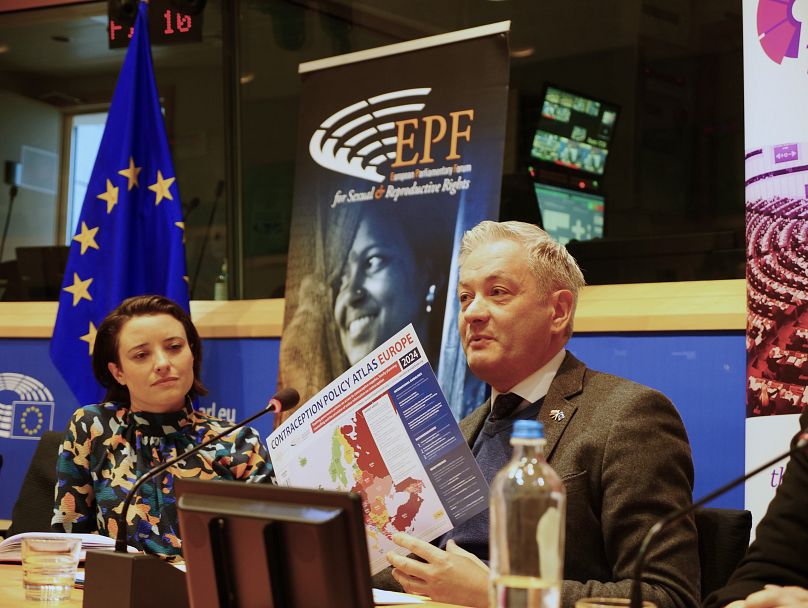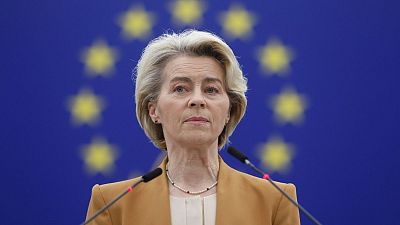Contraception is key to achieving gender equality. Individuals must be able to make informed choices about their bodies and their sexual health, MEP Robert Biedroń writes.
Valentine's Day is a time to celebrate and enjoy love and affection, but it is also the time to emphasise the right to bodily autonomy and health.
This is a good moment to reflect on the importance of having the freedom and ability to decide how and when to plan your family and whether to use contraception.
Access to modern, high-quality contraceptives and accessible contraceptive information is an essential element of sexual and reproductive health and rights (SRHR), which are human rights that are inseparable from the realisation of the fundamental right to health, as well as from the achievement of gender equality and the elimination of gender-based violence.
When women have the right to decide about the number and spacing of their children, they are more prone to access a desired education and employment, consequently leading to happier families and a more progressive, prosperous society.
Yet, according to the World Health Organization (WHO), we still have a range of barriers to tackle, such as limited choice of available contraception methods; limited access to services, particularly among young, poorer, and unmarried people; fear or experience of side effects; cultural or religious opposition; poor quality of available services; users' and providers' biases and gender-based barriers to accessing services.
I am convinced that the European Union should play a key role in ensuring that higher-quality contraceptive services are available in every corner of the union, from the shores of Portugal to the coasts of Romania and Bulgaria.
We must ensure equal rights across the entire European region so, for example, Polish women can finally have the same rights as Finnish, Spanish, or French women.
Mapping Europe on access to contraception
Although Europe has the highest contraceptive prevalence rates and the lowest abortion rates in the world, a visible East-West divide still affects the region.
The Contraception Policy Atlas Europe 2024 by the European Parliamentary Forum for Sexual and Reproductive Rights (EPF) shows that only 10 countries out of 47 — representing 21% of the countries analysed — have in place good or exceptional governmental websites on contraception.
The research also shows that 93% of countries analysed cover counselling within the national healthcare system, and only 43% cover contraceptives, including long-acting reversible contraceptives (LARCs).
In the Atlas, we see that Luxembourg, the UK, France, and Belgium provide full contraceptive coverage for young people and vulnerable groups; their national healthcare systems also cover LARCs and provide accessible and free counselling.
Sadly, my home country Poland, together with Hungary, two member states of the European Union, as well as Armenia, scored the lowest. Their national healthcare systems foresee no coverage schemes, not even for young people and vulnerable groups.
There is also a clear need for better information on governmental websites, and emergency contraception is only available on prescription.
Within the Polish government, we have been working hard to remove the need for a prescription and restore free access to contraception, so that emergency contraception will soon be made available to all Polish women and girls.
The EU's fight for reproductive rights
While each country strives to advance its domestic regulations, the European Union should play a key role in ensuring coherence and alignment across member states’ contraception policies.
We should increase awareness of the range of high-quality modern contraceptive methods, including the most reliable, such as LARCs, which include intrauterine devices (IUDs), implantable contraceptives, injectables, and other methods defined as safe and effective by WHO.
The European Union should secure funding and make modern contraception methods and supplies accessible and available for vulnerable people, youth, and adults of reproductive age including those who cannot afford it.
In light of the current backlash against gender equality happening across the EU and globally, we must take action to unequivocally denounce attacks on women's rights and support calls for the standardisation of women's rights across the union.
Just a week after we, as the European Parliament, managed to reach an agreement with the European Council on the first-ever EU law to combat violence against women, the European Parliament should be determined to continue the fight until women everywhere in the EU are protected from all forms of gender-based violence and can truly enjoy equal rights.
It's about making free and informed choices
Individuals must be able to make informed choices about their bodies and their sexual health; this is a fundamental aspect of gender equality which requires public authorities across Europe to develop and promote quality family planning services with a human rights and evidence-based approach.
Finally, we must take care of our kids — girls and boys — by providing quality comprehensive sexuality education (CSE), which includes scientifically accurate information about human development, anatomy, and reproductive health, as well as information about contraception, childbirth and sexually transmitted infections (STIs).
Only then can we guarantee that adults of reproductive age, especially women and girls, across the European Union can make their free and informed choices and have full and universal access to sexual and reproductive health rights and all related healthcare services without any form of discrimination.
Robert Biedroń (Nowa Lewica/S&D) is a Member of the European Parliament (MEP).
At Euronews, we believe all views matter. Contact us at view@euronews.com to send pitches or submissions and be part of the conversation.





